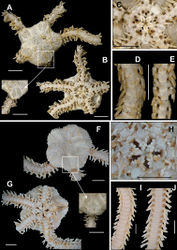Amphiura stimpsoni
| Notice: | This page is derived from the original publication listed below, whose author(s) should always be credited. Further contributors may edit and improve the content of this page and, consequently, need to be credited as well (see page history). Any assessment of factual correctness requires a careful review of the original article as well as of subsequent contributions.
If you are uncertain whether your planned contribution is correct or not, we suggest that you use the associated discussion page instead of editing the page directly. This page should be cited as follows (rationale):
Citation formats to copy and paste
BibTeX: @article{Gondim2013ZooKeys307, RIS/ Endnote: TY - JOUR Wikipedia/ Citizendium: <ref name="Gondim2013ZooKeys307">{{Citation See also the citation download page at the journal. |
Ordo: Ophiurida
Familia: Amphiuridae
Genus: Amphiura
Name
Amphiura stimpsoni Lütken, 1859 – Wikispecies link – Pensoft Profile
Description
Disk pentagonal (dd = 2.63 to 3.03 mm). Covered by imbricating scales of different sizes (Fig. 6a). Radial shields narrow, three times as long as wide, almost completely separated by two or three broad and elongated scales (Fig. 6a). Ventral interradius covered by scales similar to dorsal, but slightly smaller (Fig. 6b). Bursal slits narrow. Oral shields longer than wide, tending to be diamond-shaped (Fig. 6c). Adoral shields enlarged laterally. Two oral papillae on each side of jaw angle, distal spatuliform and proximal spiniform, the latter positioned more internally on jaw (Fig. 6c). Dorsal arm plate slightly wider than long, proximal angle acute and distal margin rounded, tending to be fan-shaped (Fig. 6d). Ventral arm plate rectangular and narrow (Fig. 6e). Four to five subequal arm spines, crown of denticles on tip. One small tentacle scale (Fig. 6e).
Distribution
The Bahamas, the islands off southern Florida, west coast of Florida, Texas offshore reefs, the Antilles, Belize, islands off Caribbean Colombia, and Brazil (Hendler et al. 1995[1], Chavarro et al. 2004[2], Alvarado et al. 2008[3]). In Brazil from Amapá, Maranhão, Ceará, Bahia (Gondim et al. in press[4]), Rio de Janeiro (Rathbun 1879[5]), and São Paulo (Netto et al. 2005[6]). Depth 1 to 126 m. Recorded herein for the first time in the State of Paraíba, between 10 and 18 m.
Remarks
Hermaphroditic and viviparous species. It lives in bottoms of mud, sand, calcareous algae (Tommasi 1970[7]), and gravel of corals and shells (Abreu-Pérez et al. 2005[8]). Two species of genus Amphiura are known for the litoral of northeastern Brazil, Amphiura stimpsoni and Amphiura kinbergi Ljungman, 1872. The latter is recorded only for the states of Alagoas and Bahia (Lima et al. 2011[9], Manso et al. 2008[10]). Amphiura stimpsoni differs formits congener Amphiura kinbergi in the number of tentacle scales (one in Amphiura stimpsoni and two in Amphiura kinbergi) and in the number of arm spines (six to seven in Amphiura kinbergi). Personal observations suggest that this species is rare along the littoral of Paraíba, both in shallow coastal waters as in deeper isobates (up to 35 m).
Taxon Treatment
- Gondim, A; Alonso, C; Dias, T; Manso, C; Christoffersen, M; 2013: A taxonomic guide to the brittle-stars (Echinodermata, Ophiuroidea) from the State of Paraíba continental shelf, Northeastern Brazil ZooKeys, 307: 45-96. doi
Other References
- ↑ Hendler G, Miller J, Pawson D, Kier P (1995) Sea stars, sea urchins and allies: echinoderms of Florida and the Caribbean. Smithsonian Institution Press, Washington, 390 pp.
- ↑ Chavarro S, Zea S, Manuel D (2004) Esponjas y otros microhábitats de ofiuros (Ophiuroidea: Echinodermata) em ambientes arrecifales del Archipiélago de San Bernardo (Caribe Colombiano). Boletín de Investigaciones Marinas y Costeras 33: 27-46.
- ↑ Alvarado J, Solís-Marin F, Ahearn C (2008) Echinoderms (Echinodermata) from Central America Caribbean. Revista de Biologia Tropical 56: 37-55.
- ↑ Gondim A, Dias T, Manso C, Christoffersen M (in press) Annotated checklist of Echinoderms from Maranhão and Piauí States, Northeastern Brazil. Check List.
- ↑ Rathbun R (1879) A list of the Brazilian echinoderms, with notes on their distribution. Transactions Academy of Arts and Science 5: 139-158.
- ↑ Netto L, Hadel V, Tiago C (2005) Echinodermata from San Sebastian Channel (São Paulo, Brazil). Revista de Biologia Tropical 53: 207-218.
- ↑ Tommasi L (1970) Os ofiuróides recentes do Brasil e de regiões vizinhas. Contribuições do Instituto Oceanográfico, Universidade de São Paulo Série Oceanografia Biológica 20: 1–146. doi: 10.1590/S0373-55241971000100001
- ↑ Abreu-Pérez M, Solís-Main F, Laguarda-Figueras A (2005) Catalogue of neritic-benthonic echinoderms (Echinodermata: Asteroidea and Ophiuroidea) from the Cuban Archipelago. Revista de Biologia Tropical 53: 29-52.
- ↑ Lima M, Correia M, Sovierzoski H, Manso C (2011) New records of Ophiuroidea (Echinodermata) from shallow waters off Maceió, State of Alagoas, Brazil. Marine Biodiversity Records 4: 1-10. doi: 10.1017/S175526721100090X
- ↑ Manso C, Alves O, Martins L (2008) Echinodermata da Baía de Todos os Santos e da Baía de Aratu (Bahia, Brasil). Biota Neotropica 8: 179–196. http://www.biotaneotropica.org.br/v8n3/pt/abstract?article=bn02208032008, doi: 10.1590/S1676-06032008000300017
Images
|
